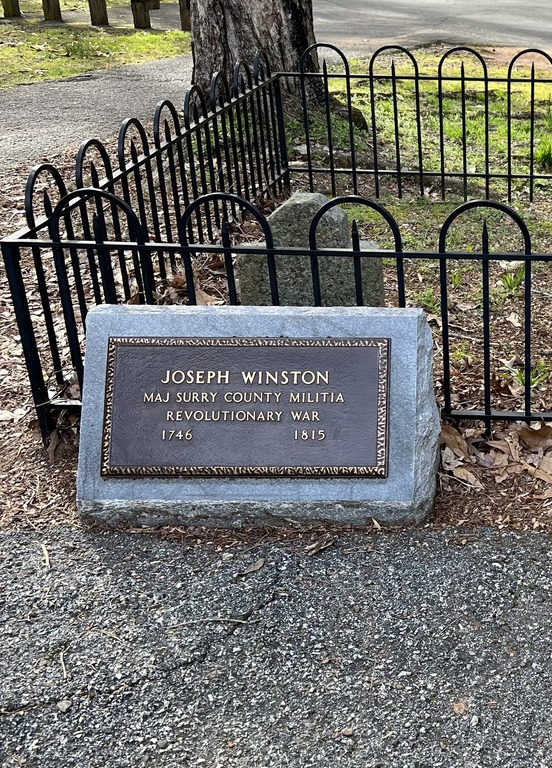Joseph WINSTON
SAR Patriot #:
P-322739
The following information was assembled from numerous sources and cannot be used directly as proof of Qualifying Service or Lineage.
It is considered a research aid and is intended to assist in locating sources that can be used as proof.
State of Service: NC
Qualifying Service: Major / Patriotic Service
DAR #: A128899
Birth: 17 Jun 1746 / Louisa / VA
Death: 21 Apr 1815 Winston-Salem / / NC
Qualifying Service Description:
- Major in the North Carolina Militia in 1775
- First Senator from Stokes County, North Carolina
- Commanded right wing of army at Kings Mountain on 07 Oct 1780
- Also fought in the Battle of Guilford Courthouse
- DAR cites
- MAJOR - Colonel SEVIER, MILITIA
- DELEGATE TO NC PROVINCIAL CONGRESS, SURRY CO
Additional References:
- DAR cites:
- NCDAR, ROSTER OF SOLS FROM NC IN THE AM REV, pg 499,503
- DRAPER, KINGS MTN AND ITS HEROES, pg 454-456
Spouse: Elizabeth Lanier
Children: Joseph; Samuel; Thomas; Martha; Robert; Sarah; Anthony;
Members Who Share This Ancestor
| Date Approved | Society | ACN | SAR Member Info | Lineage via Child | View Application Detail | |
|---|---|---|---|---|---|---|
| 1941-12-07 | KY | Unassigned | Elvis J Stahr Jr (59682) | Martha | ||
| 1968-02-29 | TX | Unassigned | William Ira Roberts (96587) | Martha | ||
| 1982-03-22 | TX | Unassigned | Joseph Morris Clark Jr (120022) | Sarah | ||
| 1982-03-22 | TX | Unassigned | John Phillip Clark (119187) | Sarah | ||
| 1982-03-22 | TX | Unassigned | Joseph Mark Clark (119188) | Sarah | ||
| 1982-03-22 | TX | Unassigned | Kenneth Russell Clark (119189) | Sarah | ||
| 1996-04-29 | IL | 207779 | Keith William Fletcher (143313) | Martha | ||
| 2019-12-06 | AR | 84747 | Jack MacGregor Campbell (175224) | Robert |
Location:
Greensboro / Guilford / NC / USA
Find A Grave Cemetery #:
Marker Type:
Old bronze DAR plaque
SAR Grave Dedication Date:
Comments:
photo used with permission of Compatriot Mitchell Anderson, 229001, KYSSAR
Directions to Cemetery / Gravesite:
Buried beside Jesse Franklin near Joseph Winston statue
